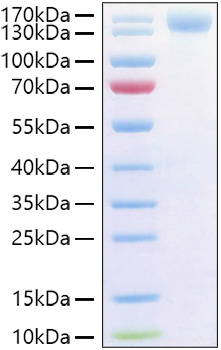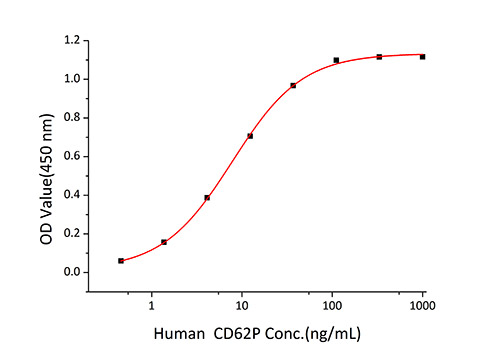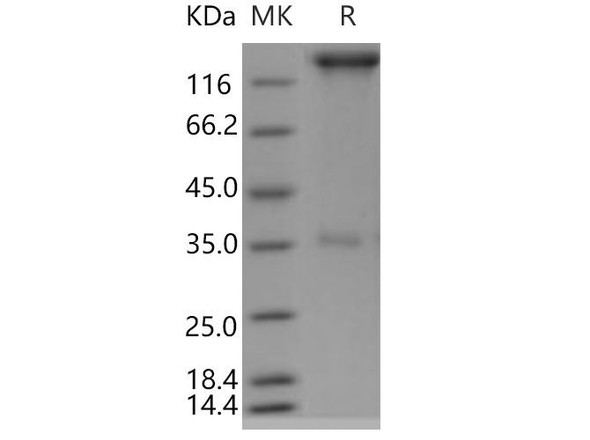Description
Recombinant Human P-Selectin/SELP/CD62P Protein
The Recombinant Human P-Selectin/SELP/CD62P Protein is a biologically active recombinant protein that plays a significant role in various cellular processes and signaling pathways in human biology. This protein is widely employed in immunological research, cell biology studies, protein-protein interaction analyses, and therapeutic development, providing researchers with a reliable tool for investigating P-Selectin/SELP/CD62P function and its implications in health and disease.
This product (SKU: RPCB1415) is produced using HEK293 cells and features a C-hFc&His tag for convenient detection and purification. The protein exhibits a calculated molecular weight of 106.75 kDa with an observed molecular weight of 130-170 kDa under denaturing conditions, achieving ≥ 95 % as determined by SDS-PAGE.. Functional bioactivity has been validated through rigorous quality control assays, confirming its suitability for demanding research applications.
Key Features
| High Purity by Affinity Chromatography | |
| Mammalian & Bacterial Expression Systems | |
| High lot-to-lot consistency via strict QC |
| Product Name: | Recombinant Human P-Selectin/SELP/CD62P Protein |
| SKU: | RPCB1415 |
| Size: | 10 μg , 20 μg , 50 μg , 100 μg |
| Reactivity: | Human |
| Synonyms: | CD62, CD62P, GMP140, GRMP, LECAM3, PADGEM, PSEL, CD62P/P-selectin, SELP, CD62P, GMP140, GRMP, LECAM3, PADGEM, PSEL |
| Tag: | C-hFc&His |
| Expression Host: | HEK293 cells |
| Calculated MW: | 106.75 kDa |
| Observed MW: | 130-170 kDa |
| Gene ID: | 6403 |
| Protein Description: | High quality, high purity and low endotoxin recombinant Recombinant Human P-Selectin/SELP/CD62P Protein (RPCB1415), tested reactivity in HEK293 cells and has been validated in SDS-PAGE.100% guaranteed. |
| Endotoxin: | < 1 EU/μg of the protein by LAL method. |
| Purity: | ≥ 95 % as determined by SDS-PAGE. |
| Formulation: | Lyophilized from a 0.22 μm filtered solution of PBS, pH 7.4. |
| Bio-Activity: | Measured by the ability of the immobilized protein to support the adhesion of U937 human histiocytic lymphoma cells. When 5 x 10E4 cells/well are added to Human SELP coated plates (10 μg/mL with 100 μL/well), > 80% cells will adhere after 1 hour at 37℃. 2.Measured by its binding ability in a functional ELISA.Immobilized PE Mouse Anti-Human CD62P Antibody at 1μg/mL (25 μL/well) can bind Human CD62P with a linear range of 0.46-7.82 ng/mL. |
| Reconstitution: | Centrifuge the vial before opening. Reconstitute to a concentration of 0.1-0.5 mg/mL in sterile distilled water. Avoid vortex or vigorously pipetting the protein. For long term storage, it is recommended to add a carrier protein or stablizer (e.g. 0.1% BSA, 5% HSA, 10% FBS or 5% Trehalose), and aliquot the reconstituted protein solution to minimize free-thaw cycles. |
| Storage: | Store at -20℃.Store the lyophilized protein at -20℃ to -80 ℃ up to 1 year from the date of receipt. After reconstitution, the protein solution is stable at -20℃ for 3 months, at 2-8℃ for up to 1 week. |
P selectin (SELP) is a 140kDa protein that is stored in the alpha-granules of platelets and Weibel-Palade bodies of endothelial cells. SELP mediates rapid rolling of leukocyte rolling over vascular surfaces during the initial steps in inflammation through interaction with PSGL1. P selectin is a cell adhesion molecule on the surface of activated endothelial cells. Cellular adhesion molecules are a large family of proteins that attach the cytoskeleton and intracellular signaling cascades with the extracellular environment. SELP is a calcium-dependent receptor for myeloid cells that binds to sialylated forms of Lewis blood group carbohydrate antigens on neutrophils and monocytes. This protein redistributes to the plasma membrane during platelet activation and degranulation and mediates the interaction of activated endothelial cells or platelets with leukocytes.








